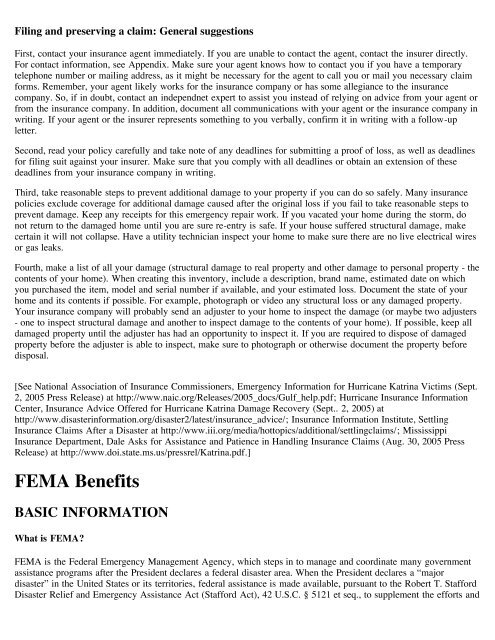Hurricane Katrina: Legal Issues - Columbus School of Law
Hurricane Katrina: Legal Issues - Columbus School of Law
Hurricane Katrina: Legal Issues - Columbus School of Law
Create successful ePaper yourself
Turn your PDF publications into a flip-book with our unique Google optimized e-Paper software.
Filing and preserving a claim: General suggestions<br />
First, contact your insurance agent immediately. If you are unable to contact the agent, contact the insurer directly.<br />
For contact information, see Appendix. Make sure your agent knows how to contact you if you have a temporary<br />
telephone number or mailing address, as it might be necessary for the agent to call you or mail you necessary claim<br />
forms. Remember, your agent likely works for the insurance company or has some allegiance to the insurance<br />
company. So, if in doubt, contact an independnet expert to assist you instead <strong>of</strong> relying on advice from your agent or<br />
from the insurance company. In addition, document all communications with your agent or the insurance company in<br />
writing. If your agent or the insurer represents something to you verbally, confirm it in writing with a follow-up<br />
letter.<br />
Second, read your policy carefully and take note <strong>of</strong> any deadlines for submitting a pro<strong>of</strong> <strong>of</strong> loss, as well as deadlines<br />
for filing suit against your insurer. Make sure that you comply with all deadlines or obtain an extension <strong>of</strong> these<br />
deadlines from your insurance company in writing.<br />
Third, take reasonable steps to prevent additional damage to your property if you can do so safely. Many insurance<br />
policies exclude coverage for additional damage caused after the original loss if you fail to take reasonable steps to<br />
prevent damage. Keep any receipts for this emergency repair work. If you vacated your home during the storm, do<br />
not return to the damaged home until you are sure re-entry is safe. If your house suffered structural damage, make<br />
certain it will not collapse. Have a utility technician inspect your home to make sure there are no live electrical wires<br />
or gas leaks.<br />
Fourth, make a list <strong>of</strong> all your damage (structural damage to real property and other damage to personal property - the<br />
contents <strong>of</strong> your home). When creating this inventory, include a description, brand name, estimated date on which<br />
you purchased the item, model and serial number if available, and your estimated loss. Document the state <strong>of</strong> your<br />
home and its contents if possible. For example, photograph or video any structural loss or any damaged property.<br />
Your insurance company will probably send an adjuster to your home to inspect the damage (or maybe two adjusters<br />
- one to inspect structural damage and another to inspect damage to the contents <strong>of</strong> your home). If possible, keep all<br />
damaged property until the adjuster has had an opportunity to inspect it. If you are required to dispose <strong>of</strong> damaged<br />
property before the adjuster is able to inspect, make sure to photograph or otherwise document the property before<br />
disposal.<br />
[See National Association <strong>of</strong> Insurance Commissioners, Emergency Information for <strong>Hurricane</strong> <strong>Katrina</strong> Victims (Sept.<br />
2, 2005 Press Release) at http://www.naic.org/Releases/2005_docs/Gulf_help.pdf; <strong>Hurricane</strong> Insurance Information<br />
Center, Insurance Advice Offered for <strong>Hurricane</strong> <strong>Katrina</strong> Damage Recovery (Sept.. 2, 2005) at<br />
http://www.disasterinformation.org/disaster2/latest/insurance_advice/; Insurance Information Institute, Settling<br />
Insurance Claims After a Disaster at http://www.iii.org/media/hottopics/additional/settlingclaims/; Mississippi<br />
Insurance Department, Dale Asks for Assistance and Patience in Handling Insurance Claims (Aug. 30, 2005 Press<br />
Release) at http://www.doi.state.ms.us/pressrel/<strong>Katrina</strong>.pdf.]<br />
FEMA Benefits<br />
BASIC INFORMATION<br />
What is FEMA?<br />
FEMA is the Federal Emergency Management Agency, which steps in to manage and coordinate many government<br />
assistance programs after the President declares a federal disaster area. When the President declares a “major<br />
disaster” in the United States or its territories, federal assistance is made available, pursuant to the Robert T. Stafford<br />
Disaster Relief and Emergency Assistance Act (Stafford Act), 42 U.S.C. § 5121 et seq., to supplement the efforts and

















